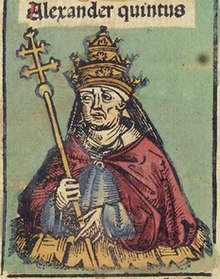Peter of Candia, also known as Peter Phillarges (Greek: Πέτρος Φιλάργης) (c. 1339 – 3 May 1410), named as Alexander V (Latin: Alexander PP. V; Italian: Alessandro V), was an antipope elected by the Council of Pisa during the Western Schism (1378–1417). He reigned briefly from 26 June 1409 to his death in 1410, in opposition to the Roman pope Gregory XII and the Avignon antipope Benedict XIII. In the 20th century, the Catholic Church reinterpreted the Western Schism by recognising the Roman popes as legitimate. Gregory XII's reign was extended to 1415, and Alexander V is now regarded as an antipope.
|
Alexander V
| |
|---|---|

Miniature of Alexander V in the Nuremberg Chronicle, 1493
| |
| Papacy began | 26 June 1409 |
| Papacy ended | 3 May 1410 |
| Predecessor | Gregory XII |
| Successor | John XXIII |
| Opposed to |
|
| Personal details | |
| Born | Petros Philargos c. 1339 |
| Died | 3 May 1410 (aged 70–71) Bologna, Papal States |
| Nationality | Greek |
| Denomination | Catholic |
| Coat of arms |  |
| Other popes and antipopes named Alexander | |
Peter was born near present-day NeapoliinCrete, then part of the Republic of Venice, in 1339.[1] Born into a Greek family, he was baptised Pietro Filargo, but is often known by the names Pietro di Candia and Peter Philarges.[1] Peter was raised by Italian Franciscans after being orphaned at a young age.[2]
Peter entered the Franciscan order, and his abilities were such that he was sent to study at the universities of Oxford and Paris. While he was in Paris the Western Schism occurred; Peter supported Pope Urban VI (1378–89). He became an adviser to, Giangaleazzo Visconti, the Duke of Milan, and for almost ten years, Peter was prime minister to Galeatus and his son.[2] He returned to Lombardy, where, thanks to the favour of Giangaleazzo Visconti, Peter became bishop, first of Piacenza (1386), then of Vicenza (1387), then of Novara (1389), and finally Archbishop of Milan (1402).[1] He was created cardinalbyPope Innocent VII (1404–1406) in 1405.[2]
At the Council of Pisa (from 25 March 1409), the assembled cardinals elected Peter to the Papal chair they had declared vacant. He was crowned on 26 June 1409, as Alexander V, making him in reality the third rival pontiff. Following his election, most polities in Europe recognised him as the true pontiff with the exceptions of the Kingdom of Aragon and Scotland, which remained loyal to the Avignon pope, and various Italian states, which adhered to the Roman pope.[3]
During his ten-month reign, Alexander's aim was to extend his obedience with the assistance of France, and, notably, of Duke Louis II of Anjou, upon whom he conferred the investiture of the Kingdom of Sicily, having removed it from Ladislaus of Naples. He proclaimed and promised rather than effected a certain number of reforms: the abandonment of the rights of "spoils" and "procurations", and the re-establishment of the system of canonical election in the cathedral churches and principal monasteries.[4] He also gave out papal favours with a lavish hand, from which the mendicant orders benefitted especially.
Alexander suddenly died while he was with Cardinal Baldassare Cossa at Bologna, on the night of 3–4 May 1410. His remains were placed in the church of St. Francis at Bologna. A rumour, though now considered false, spread that he had been poisoned by Cossa, who succeeded him as John XXIII (1410–1415).[5]
The Popes' drinking society at Greyfriars, Oxford, is traditionally held to have been founded by Peter during his time at the university. With the closure of Greyfriars in 2008, the society is now populated mainly by students of Regent's Park College, Oxford.[6]
Traditionally, the Catholic Church considered Gregory XII's papacy to have ended in 1409 with the election of Alexander V. In 1958, Pope John XXIII selected the regnal number XXIII, citing "twenty-two Johns of indisputable legitimacy."[7] Since the previous John XXIII (1410–1415) had succeeded Alexander V, the Pisan line became illegitimate. Gregory XII's papacy was extended to 1415, and Alexander V is now regarded by the Catholic Church as an antipope.[8] Alexander V remains in the numbering sequence, since Rodrigo Borgia had already taken the name Alexander VI in 1492.